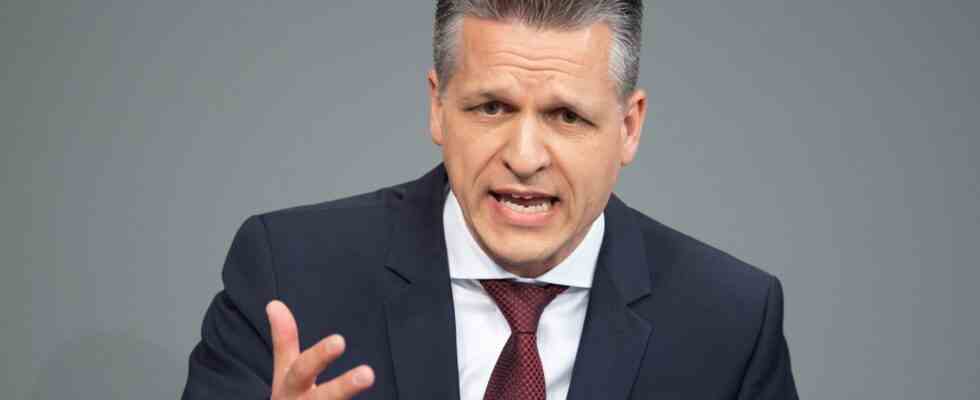Status: 03.11.2022 08:32 a.m
After their top meeting, the federal and state governments presented a series of resolutions aimed primarily at relief. However, the agreements do not go far enough for the opposition and the municipalities in several respects.
After hours of talks, the federal and state governments were able to agree on compromises on several controversial points on Wednesday: electricity and gas price brakes, financing for the care of refugees and a successor to the 9-euro ticket. But the agreements do not go far enough for everyone.
In view of the current energy crisis in particular, the Union believes that the decisions are taking effect too late. “It is very unfortunate that the winter gap in the gas price brake was not closed,” said the parliamentary manager of the Union faction in the Bundestag, Thorsten Frei, the “Rheinische Post”. According to the current status, the gas price brake should take effect from next March. However, it should be checked whether it can also apply retrospectively from February 1, 2023. Frei accused the federal government of hesitancy, for which citizens had to pay “with a great loss of prosperity” and as a result of which “many companies were threatened with insolvency”.
“We leave no one alone”
The traffic light partners SPD and Greens, on the other hand, defended the common line found between the federal and state governments. “With the measures that have now been decided, we will get through the winter well,” assured the chairwoman of the Social Democrats, Saskia Esken, in the newspapers of the Funke media group. The agreements showed all citizens: “We won’t leave anyone alone.”
From the point of view of the Green Party chairwoman Ricarda Lang, the agreements of the Prime Ministers’ Conference make it possible that “millions of people in this country will be relieved noticeably, quickly and unbureaucratically”. In addition to Lang, Britta Haßelmann, leader of the Greens parliamentary group, spoke of a “good signal for the people in our country”. The federal and state governments have succeeded in “pulling together”.
SPD parliamentary group leader Rolf Mützenich now believes it is necessary for the traffic light coalition and the opposition in the Bundestag to pull together. “Because no one benefits from small-minded party-political calculations that ignore people’s concerns.” On the part of the CDU and CSU there is sometimes too much “unnecessary lamentation” that needs to be replaced by a constructive attitude.
49-euro ticket for the Left Party too expensive
The parliamentary group leader of the Left Party, Dietmar Bartsch, was primarily disappointed with the planned successor to the 9-euro ticket after the prime ministers’ conference. From the beginning of 2023, a “Germany ticket” will be offered nationwide, which will cost 49 euros. “Many low-income people will not be able to afford this ticket,” said Bartsch. The German social association also considers this price to be too high and instead advertises a 365-euro annual ticket. “One euro a day for mobility would really be socially acceptable,” quoted the dpa news agency as saying, head of the association Michaela Engelmeier.
In addition, both the Left Party and the Union are pushing for more investment in the expansion of the transport network. The billion promised by the federal government is “just a drop in the ocean,” von Bartsch said. Union parliamentary group manager Frei also criticized: “What’s the use of a ticket that everyone pays for in the end if a bus rarely comes by?”
After the meeting of the federal and state governments, North Rhine-Westphalia’s Prime Minister Hendrik Wüst emphasized that the 49 euros for a nationwide ticket could only be an “entry price”. The financial support for the countries to expand the transport network will hardly be enough. He therefore expects the price of the ticket to rise quickly.
The President of the Association of German Cities, Markus Lewe, was also convinced that the funds promised by the federal government would not be sufficient. Timetables would therefore have to be thinned out in the future, the “traffic turnaround threatens to end up on the sidelines”.
Municipalities are pushing for help with refugee care
The criticism from the municipal side is primarily aimed at the funds planned by the federal government to co-finance the accommodation and care of refugees. In the current year, the federal government wants to raise an additional 1.5 billion euros for this, in the coming year the same amount is to go to the federal states – just for the care of refugees from Ukraine. The federal government wants to give 1.25 billion euros to refugees from other countries who sought protection in Germany.
In view of these figures, cities and districts see the federal states as more responsible. The general manager of the German Association of Towns and Municipalities, Gerd Landsberg, demanded in the “Rheinische Post” from the federal states “significantly more capacity in initial reception facilities and collective accommodation”. The municipalities are already at the limit of their possibilities in this regard.
The President of the German District Association, Reinhard Sager, also referred to the high expenditures of the municipalities. He emphasized that the federal states must pass on the financial aid provided by the federal government to the municipal level as quickly as possible.

